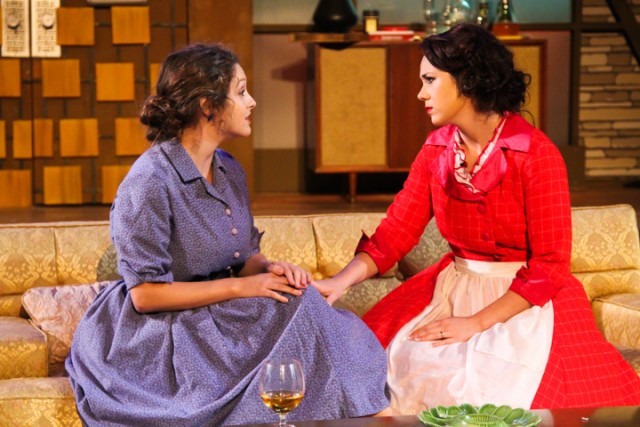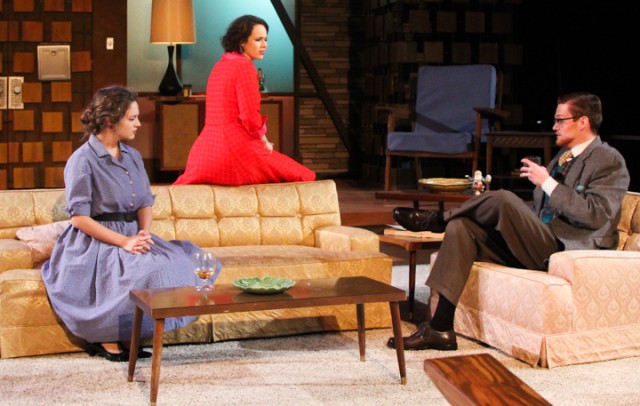
The stage looks like home. Maybe not a home today, but the home of one’s grandparents, and the home of the American Dream. Mid-century modern furniture is arranged in a family circle, and household keepsakes clutter the shelves. To the right of the stage there is a child’s room, and a doll’s house ready for play.
This is the setting of “Nora,” Baylor Theatre’s latest production. “Nora” is an adaptation by filmmaker Ingmar Bergman of Henrik Ibsen’s classic 1879 play, “A Doll’s House.” The original play and its subsequent adaptation feature the domestic dreams and deceptions of the Helmer family. The play iconically ends with the departure of wife and mother Nora Helmer, with the then-radical implication that the space of the home confines women to restrictive roles.
“Nora” cuts many of the characters and details of “A Doll’s House.” It moves more swiftly than the original and shifts directly to the Helmer’s marital conflicts.
Cason Murphy, who is directing “Nora” in partial fulfillment of his MFA in directing, adapted the play again, this time moving it to a 1959 setting.
“The 50s—that quintessential nuclear family, Americana, housewives, the male-dominated society—is something that this play fit very cleanly into,” Murphy said. “There is also the sense that things are about to change. We’re on the doorstep of the 60s and there’s going to be this radical change in how men and women interact in America.”
In Murphy’s version of “Nora,” married couple Torvald and Nora Helmer are living the American Dream, with a home, a daughter and the ideal family life intact. Graham junior Garrett McPherson, who plays Torvald in the play, excepts that audiences are still considering many of the questions that “Nora” raises.
“It says things that are very real now, and it has questions that young people think about a lot—what it means to be a man, what it means to be a woman, what it means to be in society. I think it’s surprising for people to see that that’s not a new struggle,” McPherson said.
Murphy chose “Nora” as his thesis project about a year ago. He will both produce the play and compose a thesis document consisting of research and analysis of the work. Murphy said that he is drawn to works of adaptation like “Nora,” which rework original source material to tell the same story in a novel way.
The play, which runs from November 17th to the 22nd, began rehearsals a month ago. Since then, costume and set designers, actors and crew have spent nearly every day preparing to bring the 1950s setting to Baylor and Waco audiences.
“[I’ve looked at] the things that people read and watched, seeing how they thought at the time. A lot of the stuff Torvald says was totally OK [then], but we look at it now and say that he’s kind of a jerk,” McPherson said. “With someone like Torvald, I don’t agree with what he says, but onstage I have to agree with it.”
Despite the film’s setting and perhaps outmoded gender norms, it will still speak to contemporary audiences, Murphy said. Nora’s efforts to define herself outside her roles as a wife and mother will have relevance to anyone, and any college student, trying to determine their own identities.
“That sense of being honest and true to yourself is a big question for everybody,” Murphy said. “I know that in my undergrad, that was a big thing I was dealing with. Who am I? Am I what everyone else tells me I am? Am I what everybody else looking from the outside expects? Or am I this person who’s really there underneath? How can I break forth from those expectations and effect real change in myself? I think that’s a big question that Nora’s grappling with, is how do I escape this idea that people have of me, but then am I mature enough to deal with the consequences when that change happens?”
Tickets for “Nora” are available for Tuesday, Wednesday, Saturday and Sunday’s performances. They can be purchased for $20 on the Baylor Theatre website.







